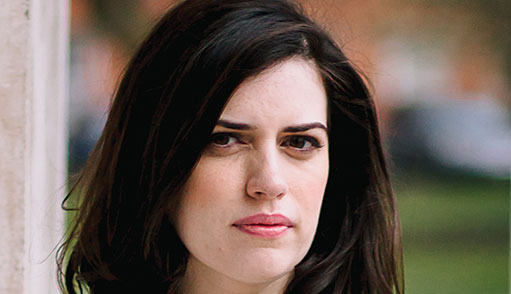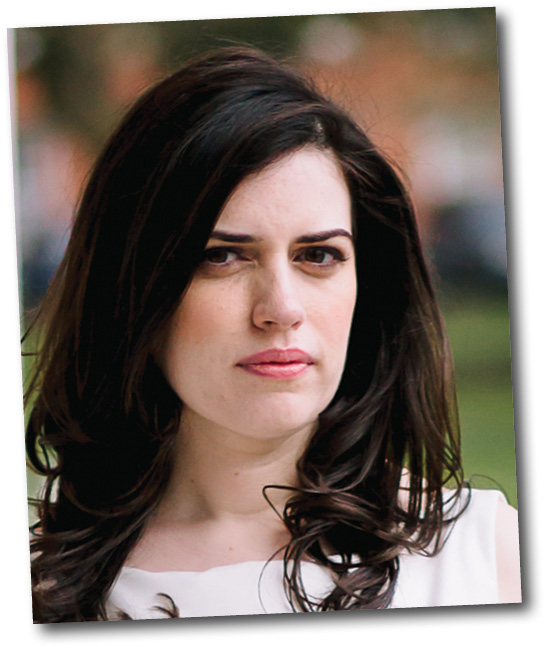Meet the Media

 A graduate of Trinity, Christine Bohan subsequently completed an MA in journalism at DCU. Having simultaneously freelanced with both the Sunday Tribune and The Irish Times for several years, she then assumed a role with The Guardian in London. Christine returned to Ireland to accept a position with TheJournal.ie where she is now Deputy Editor.
A graduate of Trinity, Christine Bohan subsequently completed an MA in journalism at DCU. Having simultaneously freelanced with both the Sunday Tribune and The Irish Times for several years, she then assumed a role with The Guardian in London. Christine returned to Ireland to accept a position with TheJournal.ie where she is now Deputy Editor.
How did you get into journalism? Was there a break?
I can’t remember a time when I didn’t want to be a journalist, but figuring out how to actually break into the industry was a whole other ball game. It seemed like such a closed shop to an outsider.
I got very involved in college media during my time as an undergraduate and was lucky enough to get accepted to the MA in Journalism in DCU. Then I had two breaks: firstly, I did my work experience placement at the Sunday Tribune newspaper, where editors like Diarmuid Doyle and Olivia Doyle ignored the fact that I was green and treated me like any other reporter, which was brilliant. I learned so much and got a lot of confidence in my writing and reporting.
Secondly, the week my placement ended, when I was about to start freelancing for the Tribune, Gary Quinn, an editor at the Irish Times, rang me up and asked if I could do some freelancing for him. I still remember that phone call – I was at a bus stop on Westmoreland Street, trying to sound nonchalant and adult while also dying with excitement. I ended up freelancing for both papers for the next couple of years and learned the three golden rules of journalism: how to write both quickly and well, how to meet a deadline (most of the time), and how to do exactly what your editor wants every time.
After freelancing for a while, I moved to London in 2010 to work online at The Guardian and came back a year and a half later when I was offered my current job at TheJournal.ie. I’ve been there for more than five years now, and still get a buzz when I walk into the newsroom every day.
“Readers may not be buying newspapers, but they still want to get the news every day”
How do you think the profession is evolving?
If I’ve learned anything from the past decade working online it’s that there is always, always going to be a place for original stories, strong breaking news and longform reporting – the only thing that is changing is the way these stories are told. Readers may not be buying newspapers, but they still want to get the news every day.
Journalists need to know where their audiences are and not be snobby about how to reach them. At the moment, for example, a lot of my work involves looking at messaging apps like WhatsApp, Messenger and Snapchat, as well as more traditional methods like email, to see if they work as a way to get the news to readers. We’re also using videos as a way to tell a lot of news stories. Some of these methods will work, some won’t, but it’s a hell of a lot of fun experimenting and figuring it all out.
What is unique about working in an online platform?
Most of the traditional distinctions between an online platform and a traditional newsroom have disappeared at this stage. We have almost 20 journalists in the newsroom – out of a staff of 70 – and every day we send our reporters out to follow up stories and cover events. All of our journalists are strong reporters who also know how to cover events online – as a matter of course, they’ll live tweet, use Facebook Live, take photos for Instagram, and take video and pictures for use on the site and on social media, as well as actually writing the article. We’re probably more aware of it than others, but most newsrooms in Ireland – whether they’re newspapers, radio or online, national or local – have a similar focus.
So really, there’s very little difference. The only one that springs to mind is the rolling, never-ending deadline and the pressure to make sure that we have breaking news stories up as soon as possible. Both of these things keep us on our toes in different ways.
Who do you admire most within the industry and why?
I look to teams of journalists who are at the top of their game. Second Captains, Dublin Inquirer, Vox and The Rachel Maddow Show, for instance. Journalism is essentially a team sport, and I’ve no time for egos. A good newsroom is essential for producing good journalism, and you can tell when things are going well behind the scenes at a particular newspaper, radio show or site.
What has been your most significant story or project to date?
I take a lot of pride in the successes of the Journal team, particularly over the last year when we’ve produced some excellent journalism and seen a jump in our readership. We’re trying to tell stories that readers wouldn’t get elsewhere, as well as covering all the breaking news stories which make up our bread and butter. Editing these stories can be an odd job because if it’s done well, the reader won’t notice it at all. It’s only when it’s done badly that it becomes obvious.
On a personal level, my biggest project has been growing our presence on Facebook over the past year, which has helped to grow our traffic and get our stories out to new readers. Facebook is the biggest social network by far, but it can be a difficult master too, as any journalist will tell you, because it decides which of your stories will get out to your followers. So, we took a back-to-basics approach: we focused on interesting, quality stories that we thought our readers would care about, and posted a lot more video. We ended up trebling our engagement and also our reach without spending any money whatsoever. In retrospect, it was both ambitious and slightly crazy, but we did it.
How do you spend your time outside of work?
I’m trying to spend less of my time on the internet, but given that I’ve checked Twitter and Slack three times in the past five minutes, I’m not sure how well that’s working. As part of this bid to stay off the internet, I re-discovered reading in the last year. I hadn’t realised how much I’d missed it until I started buying books again and now it’s probably my favourite thing to get a bit of headspace. I also love going out to restaurants and pubs with my husband and my friends, taking photos for Instagram, and playing the piano (badly). Work can bleed into free time a lot, so I’m trying to make a real effort to carve out time for myself. Although saying that, I’ve just checked Twitter again so maybe it’s something I need to work harder at.





